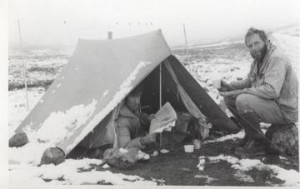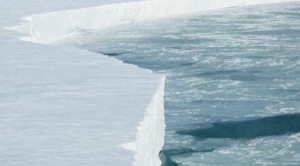Global Warming: John Mercer Glaciologists Announces Dangers of Climate Change
 Glaciology, John Mercer, And The Early Signs of Global Warming
Glaciology, John Mercer, And The Early Signs of Global Warming
To John Mercer, the concept of global warming and catastrophic regional flooding was not new. It’s been happening for ages, and the glaciologists who study the behavior of ice in seriously large quantities have long taken a special interest in flooding. They give a name “jökulhlaup,” from Icelandic, to the explosive event that occurs when the buildup of water behind a glacier breaks free from the confines of the glacier. In small scale, it happens often. But for a grand example, consider the flooding that washed over Washington State when a supposed glacier-locked lake burst loose on the nation.
For most scientists, arguments concerning the meanings of the ridges in the scablands ended in the 1940s. Geologists, in general, agree that the scabland ridges are larger and more expressive versions of the ripples sometimes seen in mud on a creek bed. Yet before 1940, many scientific leaders continued to argue against the concept of any rapid changes in the world water table. However, some men did hold to a different timetable. Even back in 1947 Swedish geophysicists Hans Ahlmann argued that global warming might push the threat of catastrophic flooding right into the present century. Still, for the larger part of research and study, it was into the 1960s before scientists began to consider global warming as a possible threat to modern man.
The idea of major climate-related disasters grew slowly. In 1962, John Hollin argued the danger of small climate changes and how they could affect ice in Antarctica (1). Hollin and Alex Wilson, a fellow believer, expressed grave concerns that immense sheets of ice could soon be floating across the southern oceans. They wrote of tsunamis, rising sea levels, and a mountainous glacier rushing forward at hundreds of meters per day. But very few others joined the outcry. The Hollin / Wilson vision was too imaginative, too far reaching, and too “unlikely.” With the Antarctica glacier anchor ranging more than four kilometers in depth, Hollin’s arguments that rising seas would lift it free of the root bedrock seemed highly unlikely.
Global Warming – A Shout From John Mercer.
Even into the 1970s, global warming remained far outside the realm of public concern. But not so for an Ohio State University glaciologist named John Mercer. To Mr. Mercer,  certain disturbing similarities and dissimilarities between the Eurasian Artic and the western Antarctica needed immediate attention. For example: The continental shelf of both Polar Regions was but a few hundred meters deep. However the 2.5-kilometer thick ice sheet resting on the western Antarctica reflects a sharp contrast to the Eurasian Artic with its nearly non-existent layer of grounded ice.
certain disturbing similarities and dissimilarities between the Eurasian Artic and the western Antarctica needed immediate attention. For example: The continental shelf of both Polar Regions was but a few hundred meters deep. However the 2.5-kilometer thick ice sheet resting on the western Antarctica reflects a sharp contrast to the Eurasian Artic with its nearly non-existent layer of grounded ice.
To Mercer, the distinctions indicated great threat possibilities from global warming. If the ice sheet that covered western Antarctica should disintegrate, the known sea level could raise by as much as six meters. Coastlines throughout the world would experience indescribable flooding.
Mercer’s findings, theories and the resultant investigation concerning the Eurasian Arctic and the associated glacial history evoked mixed opinions. Scientists exchanged papers and test results – many of them expressing contradictory views. And even as the arguments continued, the European Science Foundation initiated new and more intensive research programs. From seven European countries, over 50 scientists took part in the first POlar North Atlantic Margins (PONAM) study of the Barents Sea.
But in the end result of all the studies and testing, researchers determined that the west Antarctic ice sheet was capable of “resisting substantial rises in sea level” (2). However, although not taken seriously, some risk factors were acknowledged:
- The melt-rate could increase if the ocean around Antarctica warmed
- Unless balanced by snowfall and in increase in evaporation, the ices shelves could eventually disappear.
Thus the west Antarctic ice sheet could be at risk of rapid collapse. An increase in global rise in sea level could follow. Yet the arguments continued, and most scientists in the group protested that Mercer’s “threat of disaster” was far, far into the future. Leaping ahead to 2014. In a recent New York Times report, modern scientists are claiming that the collapse of the ice sheet is already in progress. A catastrophic rise in sea levels seems inevitable, or so they say. Look for it in upcoming journal releases from both Science and the Geophysical Research Letters.
It seems that John Mercer was indeed a man ahead of the times.
Article presented as a part of the ongoing American Cooling and Heating educational series. For more information on American Cooling and Heating, click here.
Disclaimer: This article and its content do not constitute legal, financial, technical, or medical advice. While every reasonable effort has been made to ensure that this document is correct at the time of publication, the company and its employees and agents disclaim any and all liability to any person in respect of anything or the consequences of anything done or omitted to be done in reliance upon the whole or any part of this article and its content. All trademarks, logos, and associated content displayed are the property of their respective owners.
1) http://www.aip.org/history/climate/bib.htm#82
2) American Scientist, P.O. Box 13975, Research Triangle Park, NC, 27709, U.S.A.
Reff http://www.aip.org/history/climate/floods.htm
Reff http://oceans.mit.edu/featured-stories/modeler-observationalist-divide-eyes-greenland
climate change, global warming, john mercer